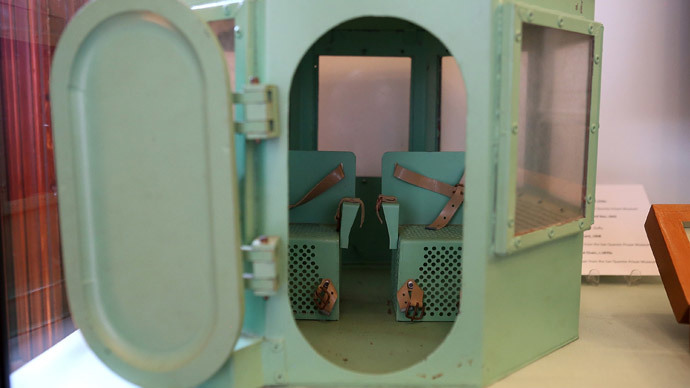‘No guarantee nitrogen gas execution is painless’

Oklahoma has added the gas chamber to its execution methods. The head of the Death Penalty Information Center, Robert Dunham, told RT the decision was made hastily, with no medical research and that nitrogen was "inappropriate for use on humans".
RT:What was your reaction to the news?
Robert Dunham: I think my reaction is the one of disappointment. It shows first that the legislature in Oklahoma and the government of Oklahoma are out of step with the views of vast majority of Americans and are certainly out of step with the views of the rest of the world. Oklahoma moved very very swiftly because their lethal injection protocol is under attack to come up with some alternative method of execution. But in doing so there is no medical research, there is no indication of a very very fast legislative response here.
There is no indication that they looked into what the experience has been with the veterinarians, and animals and things along those lines. And it turns out if you look at what the American Veterinarian Association has said, nitrogen gas is inappropriate for use among most mammals, and particularly large mammals which of course human beings are.
READ MORE: Texas gets supply of lethal injection drug for death row
RT:State officials say the new method is painless. But it has never been tested on humans – so how do they know?
RD: It has not been tested on humans because it is unethical to test it on humans. But I think what is really instructive is the language used by the Oklahoma legislatures and the Oklahoma governor drawing this entire process. It is virtually identical to what the legislatures were saying when they went into lethal injection. They without a whole lot of research and without medical experience to back it up were saying that the lethal injection is going to be swift, is going to be painless, and is going to be effective. So this is the same rhetoric. There is no guarantee whatsoever. It may work. It may be painless, but we don't know. And it is unethical to experiment and find out.
RT:Are there any humane ways of executing people?
RD: I don't know what the answer to that is. I can tell you that the people of good will, whether you're for the death penalty or against the death penalty, if it is going to get carried out you want it to get done in a manner as quick and as painless as possible. And recent polls in the US show that among the death penalty proponents that view is held by over 70 percent of people who say that they support the death penalty. As Pope Francis recently said, “the is no humane way to execute somebody.” At its core the death penalty is a violent act. The execution of a person, the taking of their life against their will is a violent act. And I think the failures of lethal injection and the swift but not particularly thoughtful reaction by states like Utah with their firing squad proposal and Oklahoma with the gas proposal just kind of illustrates that when legislatures are having these really fast, thoughtless responses, they're not taking into consideration things you would expect a careful legislature would.
RT:How do you believe this sensitive subject should be handled?
READ MORE: Alabama man who spent 30 years on death row walks free
RD: I think there is a rising concern about the problems with the death penalty in the United States. And that concern - there're a lot of reasons for it. With the innocence revolution, with the development of DNA technology, there have been more and more instances we've seen people who are innocent coming off the death row. In the last month alone in the US there have been two death row exoneration. And one of the scariest things about this is, you know with DNA you're able to examine whether somebody did the offense or did not do the offense. DNA is not present in vast majority of these cases. It is available as an evidentuary tool in maybe 10-15 percent of the cases.
And what we have learned with the DNA cases is, every other piece of evidence that was used to convict the person is wrong. And so we have seen a disturbing number of confessions that are either false or fabricated. We have seen eye witness identification that simply is incorrect. We have seen things like prison informants giving false information, and an extraordinary amount of preceptorial or police misconduct. So what the DNA has shown us is that you can't really have a whole lot of confidence in the rest legal process in capital cases. And I think the folks in the US are very concerned about that and it is one of the reasons why support for the death penalty is at a forty year low in our country.
The statements, views and opinions expressed in this column are solely those of the author and do not necessarily represent those of RT.











